| Srl | Item |
| 1 |
ID:
160052
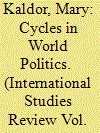

|
|
|
|
|
| Summary/Abstract |
This article argues that we are living through a period when political institutions are out of step with dramatic, economic and social changes. In similar periods in the past, war has often played a key restructuring role. But contemporary wars are much less likely to achieve this. The main agents of change are social movements and new forms of communication. The article concludes that we need new forms of global governance and some critical rethinking of academic discipline.
|
|
|
|
|
|
|
|
|
|
|
|
|
|
|
|
| 2 |
ID:
192475
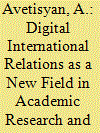

|
|
|
|
|
| Summary/Abstract |
Digital International Relations * a textbook for higher education institutions edited by Yelena Zinovyeva and Sergey Shitkov, is a comprehensive study of the role of global digital transformation in key world political trends. In accessible form, it explains key impacts of the digital transition on international relations.
|
|
|
|
|
|
|
|
|
|
|
|
|
|
|
|
| 3 |
ID:
167854
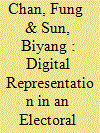

|
|
|
|
|
| Summary/Abstract |
Widely known by the public, the Chief Executive of Hong Kong is selected not by universal suffrage but by a 1,200-member Election Committee (EC). While candidates Carrie Lam, John Tsang, and Kwok-hing Woo all ran in the Chief Executive Election of 2017, only Lam received the blessing of authorities in the Mainland. Though Tsang had led the polls throughout the entire campaign and was popular on several social media platforms, a majority of EC members still cast their vote for Lam as Chief Executive. This was the first time that EC members voted against popular opinion in the Chief Executive Election. This paper analyzes the limited power of social media under elections that are under the influence of Mainland China. It also examines the problem of legitimacy in such electoral settings and the way in which authorities in the Mainland have influenced electoral outcomes through defects in the institutional systems of Hong Kong. The 2017 Chief Executive Election affirmed the tightened control of Mainland authorities over the affairs of Hong Kong.
|
|
|
|
|
|
|
|
|
|
|
|
|
|
|
|
| 4 |
ID:
119910
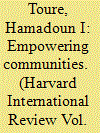

|
|
|
|
|
| Publication |
2012.
|
| Summary/Abstract |
The role of Information and Communication Technologies (ICTs), particularly broadband, in boosting economic growth and national competitiveness is now widely recognized. The ICT infrastructure is today both a vital national asset and an investment in a nation's future competitiveness in the growing global digital economy.
|
|
|
|
|
|
|
|
|
|
|
|
|
|
|
|
| 5 |
ID:
120549
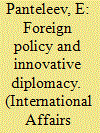

|
|
|
|
|
| Publication |
2013.
|
| Summary/Abstract |
FOR SEVERAL MONTHS NOW, the International Affairs journal has played host to a debate on the new version of the Foreign Policy Concept of the Russian Federation. Views have been expressed by eminent experts on various aspects of its content as well as its strategic principles, and the major foreign policy thrusts of Russia have been closely scrutinized.
|
|
|
|
|
|
|
|
|
|
|
|
|
|
|
|
| 6 |
ID:
113260
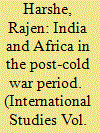

|
|
|
|
|
| Publication |
2010.
|
| Summary/Abstract |
This article presents an overview of Indo-African ties in the post-Cold War period in the context of the accelerated pace of globalization and economic reforms. It begins by taking cognizance of a few significant social realities in Africa such as the advent of democratic regimes in different African countries, the burgeoning of regional organizations as also the emergence of the African Union, the growing presence of India and China in Africa, etc. Subsequently, it analyzes the complexities of Indo-African ties in the realm of security, trade, business, investment and overall development cooperation and suggests the pathways that could refashion such ties under globalization.
|
|
|
|
|
|
|
|
|
|
|
|
|
|
|
|
| 7 |
ID:
138186
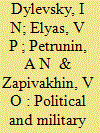

|
|
|
|
|
| Summary/Abstract |
The authors look at the political and military aspects of the Russian Federation's state policy on international information security and the guidelines to be followed to counter military and political threat of aggressive use of information and communication technologies.
|
|
|
|
|
|
|
|
|
|
|
|
|
|
|
|
| 8 |
ID:
173296
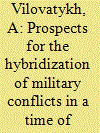

|
|
|
|
|
| Summary/Abstract |
AMID the current technological breakthrough, the spread of information and communication technologies (ICT) is one of the important factors shaping a new political reality in Russia and the world as a whole. Scholars note that at the present time, government agencies, the business community and private users are increasingly dependent on computer technology and access to information networks [2]. Likewise, participants in world politics have significant advantages in achieving their goals when one of the tools they use to pursue their objectives is the global information and communication space, which essentially has no borders.
|
|
|
|
|
|
|
|
|
|
|
|
|
|
|
|
| 9 |
ID:
132050
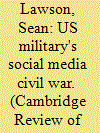

|
|
|
|
|
| Publication |
2014.
|
| Summary/Abstract |
This article uses the controversy within the United States (US) military over the use of social media by individual military professionals as a window into larger debates about the nature of information-age conflict. Information and associated technologies are now central to the US military imaginary. But the controversy over social media is one indicator that the dominant discourse of information-age conflict is neither stable nor total. The introduction of a new technology can serve as an antagonism that turns latent, potential contradictions into substantive differences for policymaking. Thus, though the US military generally has embraced information and communication technologies (ICTs), the introduction of a particular ICT can still be a source of controversy. Military imaginaries, technologies and the relationships between them remain dynamic, contingent and sometimes contentious.
|
|
|
|
|
|
|
|
|
|
|
|
|
|
|
|
| 10 |
ID:
180741
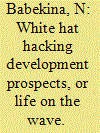

|
|
|
|
|
| Summary/Abstract |
THE EVENTS of 2019 and 2020 have turned everything upside down and transported us to a radically different reality. This is one of those instances where we have all said, in one form or another: "Life will never be the same again." It is true. The pandemic continues to "reshape" human consciousness, forming a conceptually new paradigm of the world order, unequivocally immersing an increasing number of familiar processes in the digital space. Whereas before ICTs were mainly considered a luxury, a privilege and a means to increase comfort, today they have become the one and only way to maintain habitual life processes.
|
|
|
|
|
|
|
|
|
|
|
|
|
|
|
|